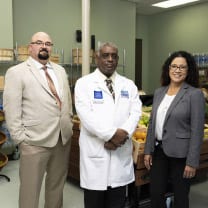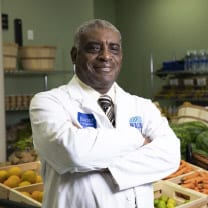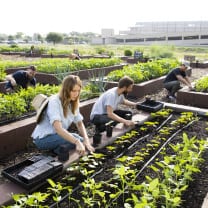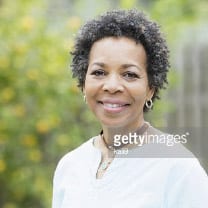The inspiration for the community farm began with Alan Vierling, former hospital executive vice president and administrator. From his seat at a Red Sox game at Boston’s Fenway Park, he noticed a thriving urban farm on the roof of their front office. Back in Houston, he mentioned the idea to Chris Okezie, now the system vice president of operations. Alan explained how a farm at LBJ Hospital could help combat food insecurity, teach patients and community members about healthy produce and give them the skills to grow their own food. Chris thought he was joking.
Undeterred, Alan put together a team to examine the possibility. Along the way, a patient interaction confirmed his dedication: the man, stashing hospital food, told Alan he otherwise wouldn’t have any when he was able to go home.
Alan found a kindred spirit in Hilary Y. Ma, MD. Dr. Ma treated cancer patients through the MD Anderson Oncology Program at LBJ. He had observed firsthand the daily challenges people in this isolated, medically underserved community faced. Dr. Ma saw the farm as a perfect way to address socioeconomic and psychosocial issues and food insecurity.
answering the perennial question: who’s going to pay for all this?
The project needed funding. Jerry Gresham, a grateful patient and cancer survivor from MD Anderson Cancer Center, donated $100,000. Dr. Ma and LBJ’s leadership team won another $150,000 grant from the TMC Health Policy Institute.
The project also needed partners. Dr. Ma had already visited urban farms around Houston, including Finca Tres Robles in Houston’s Second Ward, a farm operated by Small Places LLC. The LBJ team recruited brothers Tommy and Daniel Garcia-Prats, of Small Places, to serve as consultants along with Joe Novak, a prominent expert in sociohorticulture, the study of the role plants and gardening play in creating healthier, happier people.
breaking new ground, in more ways than one
Following Novak’s blueprint, the Community Farm at LBJ Hospital took shape. More than a space to grow fresh fruits and vegetables for hospital patients and community residents, it provides a working classroom—even an ecosystem—for the community.
Rebecca Verm, another passionate and experienced urban farmer, joined the team in early 2019. It’s been a dream come true for her, as she sees this as a unique opportunity to collaborate with the larger community. Her vision is to create a viable, sustainable organic farm using the most environmentally friendly practices and serving as a powerful model for other institutions to do the same.
Thanks to volunteers from the community, hospital staff, family and friends, the community farm should soon be producing 500 pounds of fresh produce every week.
![]()
![]()
![]()
![]()
![]()
![]()







